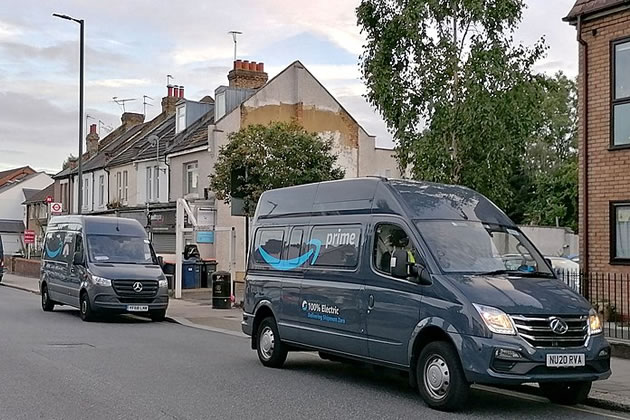Home Delivery Boom 'Becoming Unmanageable' Report Warns
Online shoppers need to change behaviour to protect environment

Amazon’s branded vans are often electric. Picture: Philafrenzy
Online shoppers should change their habits to improve sustainability as the e-commerce boom is set to become unmanageable in London, a new report has warned.
As world leaders gather in Glasgow for the COP26 climate summit this week, the Centre for London thinktank has published its new report calling for the Mayor of London to make freight journeys “as green and clean as possible”.
The thinktank has on Tuesday called on Sadiq Khan to work with delivery companies to install up to 10,000 parcel pick-up points or lockers across London and incentivise customers not to opt for home delivery.
One recommendation in the report is to introduce an online sales tax for home deliveries to encourage businesses and customers to make the most of pick-up or drop-off points.
Vehicles carrying freight make up 25 per cent of London’s carbon emissions from transport despite accounting for just 15 per cent of vehicle miles travelled, but Centre for London has warned this could increase as the number of parcels delivered in London is expected to double by 2030.
Nicolas Bosetti, head of data and insight at Centre for London, said, “Londoners may like the convenience of doorstep deliveries but the way we currently move most of our goods comes at a high cost for our health, climate and for the businesses and workers who need to use our roads to get around.
“Many delivery companies already have plans to make their journeys more sustainable, but we need to encourage them to deliver to and from fewer places and support more of them to switch to cleaner vehicles. This means creating space for pick up points, consolidation centres and electric vehicle charging points.”
The report has recommended that 90 per cent of Londoners should be within 250 metres of a universal pick-up or drop-off point by 2025 as they would allow companies to deliver more parcels at once to fewer locations, reducing traffic and therefore emissions.
As more people across the UK have turned to home deliveries since the start of the pandemic, the number of delivery vehicles on the roads has also shot up.
Between March 2020 and March 2021, registrations of new diesel vans increased by 82 per cent nationally, while registrations of new petrol vans doubled.
Kate Langford, programme director for non-profit organisation Impact on Urban Health’s “Effects of Air Pollution” programme, said that the rising number of polluting vehicles and journeys in London is “particularly concerning”.
Ms Langford said, “We urgently need to design systems that manage the rise of deliveries and online shopping and reduce vehicle traffic on the roads. Residents must be engaged in the design of these new systems, to make sure that they protect people’s health and work for everyone.”
Earlier this year, Sadiq Khan addressed the issue of increasing home deliveries at a meeting of the London Assembly following the publication of a report into the potential of electric cargo bikes.
Mr Khan said: “Transport for London is working with the freight industry to reduce the adverse impacts of freight traffic. As part of my Civic Innovation Fund, TfL’s FreightLab project is trialling approaches to implementing green last mile delivery concepts, including cargo bikes. TfL has also worked with several Business Improvement Districts to fund trials of cargo bike schemes.”
The Mayor of London told Assembly Members that a cargo bike delivery scheme in Hammersmith signed up 125 businesses and made over 3,600 deliveries, which is estimated to have saved around 788kg of CO2 emissions.
Joe Talora - Local Democracy Reporter
November 2, 2021